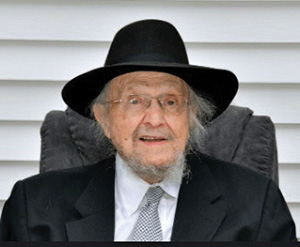
Rav Dovid was my rebbe for 60-plus years, and I had a relationship with him that was very beneficial for me. I would bring all halachic shailas to him. I’ve been living in Teaneck for 40 years, and I think I once asked another rabbi a shaila on a Shabbos. Otherwise I always went to Rav Dovid. It’s a tremendous loss.
I grew up on the Lower East Side and moved to Queens after my bar mitzvah. I continued in Mesivta Tiferes Jerusalem (MTJ) for high school and continued learning there afterward.
My first personal interaction with Rav Dovid happened on Shabbos, when I was about 10 years old and it was Musaf Shabbos Rosh Chodesh. I went to daven at MTJ because I didn’t like the shtiebel my father davened in. Rav Dovid would sit in the back of the beis midrash at a table with everyone else. I had just davened Musaf (to myself) and Rav Dovid came over to me and said, “You davened too quickly.” Of course, as a kid, I denied it. He said, “I’ve been davening a lot longer than you and I can’t say it that fast.”
Rav Dovid was happiest when he sat and learned. He wrote chidushim all the time. It was known that when he locked himself in his office, he would just write chidushim. I used to kid with him that it was time to get rid of the Parker pen—that it wasn’t as good as it used to be.
After Rav Moshe [his father] was niftar, he accepted the responsibility of being rosh yeshiva [of MTJ] but he didn’t want to go out and actively fundraise. He avoided public speaking outside the yeshiva.
He was a unique individual. The Torah, everybody knew, but his anivus was beyond. He was a presence. He didn’t have to speak to have an impact. I had the zechus to have breakfast with him from time to time and people would come over and ask for a bracha and he always gave it. He treated people with patience and respect. Whenever I discussed something with Rav Dovid, he would follow up and ask about it. He cared. We would talk about business and Halacha, and the way he looked at things was very insightful and he helped me tremendously.
Over the years, people would call me to bring a shaila to him. You could ask him anything; nothing was off limits for him. There was never a question that was a stupid question. He took the time to answer everything. Even if it took time away from his learning. Except for politics; he never wanted to answer those kinds of questions.
A few interesting anecdotes:
—I brought him a question from a friend of mine. Rav Moshe had answered this question and took a lot of flack for it, and his answer was not accepted by everyone. When Rav Dovid responded, he wrote, “This was the psak of my father, but you should know it’s not mekabel [accepted] by everyone.”
—Another time, Rav Dovid walked up the four flights of stairs to shiur to find two bachurim discussing two gedolim at that time, trying to determine who was the bigger gadol. Rav Dovid said to them, “You must be bigger, because you tested them both!”
—I was once asked by a rabbi to ask Rav Dovid about eating sirloin and filet mignon. So I said to him, “Rebbe, there are many good hashgachos that can be relied on.” But he said no. “What about in Israel?” I asked. He said no. “But can you eat in the restaurants that serve it?” I tried again. He answered, “Yes.” Then he looked at me and said, “You asked me the question, I gave you the answer.” And I responded, “Rebbe, I don’t go shopping [around for a psak].” That was the most I ever saw him laugh. (Rav Dovid explained: An Ashkenazi cannot be mevatel the minhag Yisrael.)
The Lower East Side was a great place to grow up. When my son was working in the city, he had time and wanted to learn. I told him to go to MTJ. After a while he told me why I had told him to go learn at MTJ. I was glad he was able to have that experience. Rav Dovid was mesader kiddushin at all of my children’s weddings.
I feel like I’m in aveilus. It’s hard. When you have a parent passing away, that’s derech haolam and a parent isn’t really teaching you anymore. But a rebbe is always teaching you and that’s hard to replace. Yehei Zichro Baruch!
By Norman Schmutter, as told to Michal Rosenberg










